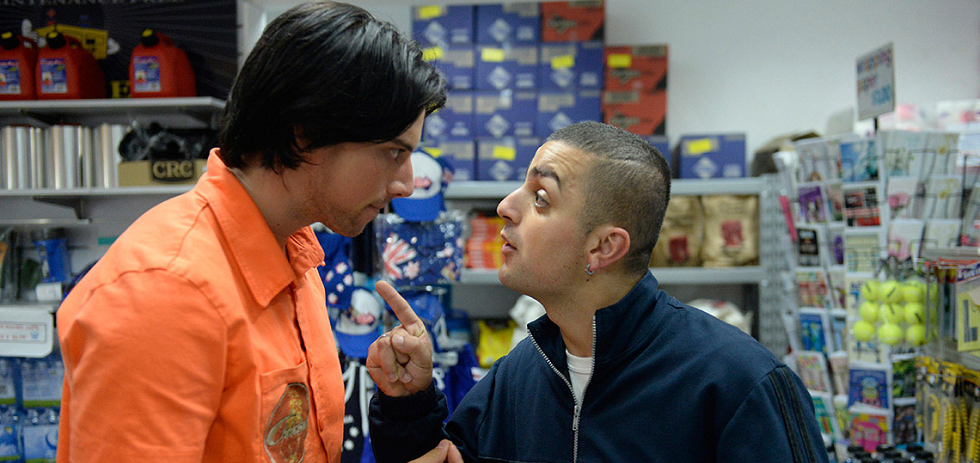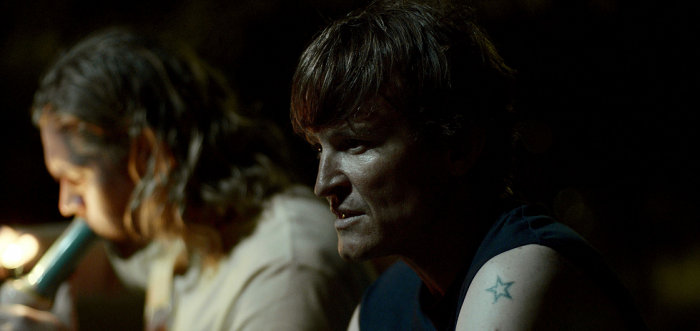
“We didn’t make this for you.” This was Abe Forsythe’s message to everyone who took umbrage at the very premise of Down Under, his satirical comedy set in the days following the 2005 Cronulla Riots. The question of why those people would be attending the world premiere in Sydney where he delivered it probably mattered very little next to the raucous applause he got in response from the State Theatre audience, and fair enough—it was his night to celebrate. The film, meanwhile, wants to provoke as much thought as laughter on the racist undercurrent of modern Australian society that erupted on that December day. It hangs on two cultural perspectives: handsome Lakemba student Hassim (Lincoln Younes) is urged by his hothead friend Nick (Rahel Romahn) to go and retaliate for the riots, and Shire layabout Shit-Stick (Alexander England) must take his humble cousin Evan (Chris Bunton) on his own mates’ “Lebbo”-bashing spree. The ensuing black comedy, violence and commentary are about as elucidating as a left-wing Facebook meme. Memes, after all, aren’t shared to change people’s mind but to provide another banister on which narrow social groups can prop up their own beliefs, no matter how much its spreaders insist otherwise. Likewise, for all the talk of Down Under throwing a populist veil over a discussion we need to have, it’s only further equipping those already in the discussion with a bloated sense of superiority.
This starts with the cast: an equally-numbered pair of racial groups, with Jason (Damon Herriman) egging Stick, Evan and Ditch (Justin Rosniak) into their rampage, and Ibrahim (Michael Denkha) and D-Mac (Fayssal Bassi) tagging along on the retaliation. While both are bone-headed in their own ways, the gags and character development are much more at the expense of the prejudice-heavy Shire group, so it avoids the fallacious notion that both groups’ prejudices are equally to blame for racial violence. Still, much like the lead-in to a joke, it’s a premise that’s almost too easy to buy into, sitting uneasily considering the messy real-world context it wants to invoke. There’s little to no acknowledgement of the Greeks equally targeted by the text message and rioters, or the Asians or Jews threatened in subsequent messages, or the indigenous Australians utterly ignored in both the furore and this movie named after the country stolen from them; a very narrow purview for something that’s meant to be timely and scathing.
But perhaps this is a conscious decision to give its joke focus, and have its dress-down of the masculine quickness to violence land more effectively. It certainly spends a lot of time picking through the anger on both sides. The whites are pushed into a witch hunt by their ersatz patriarch, Stick’s relative Graham (Marshall Napier), who hands them an ANZAC musket to do the deed; the hints at the hypocrisy in honouring the Gallipoli troops but not those dying for seeking a better life here is the closest Forsythe and company come to a punchline that’s salient and effective. The Lakemba crew, meanwhile, have concerns closer to home, with Hassim torn between flying straight with his uni studies or joining the inevitable punch-up as part of a search for his brother, who has been missing since the riots. Once the dust has settled, the final scene shows that Forsythe is at least sensitive to who the real victim is, even if all of them are meatheads or meathead-sympathisers that are tough to care about.
Sensitivity shmensitivity though, right? This is a Cronulla riots comedy, and as Forsythe says, “there is nothing more satisfying than getting people to laugh at something they feel they shouldn’t be laughing at.” Going off his premiere speech, he’s keen to nurture this provocative impulse, invoking the box office death of his last feature Ned and thanking those who have given him a chance since. It’s at least constructed more handsomely than that film—at times, through Lachlan Milne’s cinematography, it looks and sounds like a Channel Nine biopic along the lines of Schapelle or Underbelly, only played up for the funhouse mirror of real events it is. As it turns out, the two films ultimately have a fatally similar code, not just in being screechingly absurd and featuring Damon Herriman, but in making wildly crass jokes at the expense of social minorities, then—and this is the kicker—trying to pre-emptively protect themselves with savvy characters that belong to those minorities. In Ned’s case, it’s an indigenous tracker who is only bemused by the antics of the incompetent white folk around him, and here, it’s twofold: Bunton, whose character counters the white crew’s moronism with gotcha punchlines and sentimentality, and more importantly Younes, a smarter cookie who is strung along into a conflict that jeopardises his promising future. But rather than make the film more complex, they get drowned out by the clamour of the laboured gags—they work especially hard to get a Shire/Lord of the Rings joke in—and histrionic performances that surround them; progressive window dressing on the set of a uni revue-level stage show.

These characters are still the butt of easy jokes that keep them at a remove. And truly, they are easy, especially when it comes time to work homosexuality into the picture as yet another ironic lasso with which Forsythe can yank his row of straw-men off their poles. When one especially thuggish and unpleasant character is revealed as gay, it’s done in the most bombastic way possible; presumably the none-more-satisfying means by which Forsythe is getting us to laugh at it. One’s man’s satisfaction is another’s unfunny demonisation of closeted men, I suppose, because make no mistake, that is the flat-as-roadkill punchline: “…and then he was a gay.” Period. Underline it. Comedy. Or better yet, speaking of The Gays so reductively represented here: David Field as a mincing crime lord, ordering his boy toys around in nasal Thai, calling to mind less the great cinematic provocateurs and more the baby boomers that say “ching chong cha” when faced with the world’s most widely spoken language. His character, visited by the lads to stock up for the fight ahead, serves very little purpose outside of foreshadowing the later outing, and given how limp it is, Forsythe and company needn’t had bothered.
For a film that’s aiming to be incisive and challenging, the question of “why?” becomes way too relevant way too often in Down Under, less in meditation on predjudice and more on what the hell is even going on in the story. A 7-Eleven attendant (read: author’s mouthpiece) gives an erudite response to Nick’s posturing threats, who then gets a gun held to his head in a tense stand-off. One minute we’re jeering at Jason’s horrible, child-abusing wife (Harriet Dyer), the next we’re watching Stick tuck her infant child into bed. Blood and fire billow forth in a bombastic climax that wavers between intentional and unintentional awkwardness, and then it’s time for a very special message. There’s nothing natural about these juddering gear changes, and so they shred the experience into a lethargic parade of opportunities for us to feel good about ourselves, either through left-field moments of schmaltz or blunt opportunities to devilishly mock the characters through to their final fates.
Missing in all of this is anything we don’t already know or feel. None of the gags or drama in Down Under—as confronting and important as it would like to think it is, judging from the sombre ending—diagnose the anger that fuelled the Cronulla Riots, where it comes from, or how it might be quelled. The only culprit left to discern from this supposed zeitgeist capturer are the perpetrators, and so, by default, it’s a matter of Us, that elusive concept of togetherness that feeds into both existing, tacitly separated social groups and the idea that the solution is a matter of our attitude; the same which spurs us to share memes and petitions on social media. With that as our measure, nothing is being challenged, except, perhaps, the phantom audience of impressionable nationalists that would change their minds if only we could send them the right rhetorical smackdown and bring them onto our esteemed level. The only attraction Down Under can offer is to yearning progressives looking to be vindicated through gory spectacle and it’s not even terribly good at that. This isn’t feather-ruffling—it’s peacocking.
